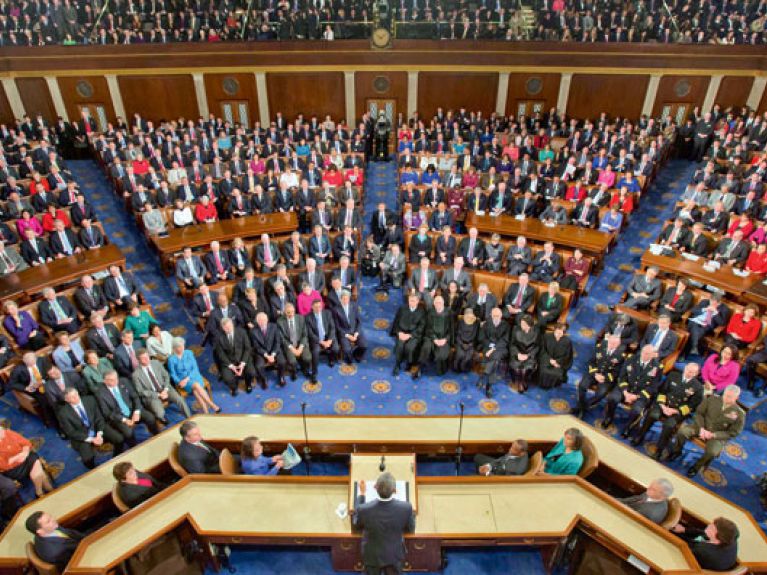US election: contrasting foreign policy
Marco Overhaus, expert at the German Institute for International and Security Affairs (SWP), on the US presidential candidates.

Dr. Overhaus, in an analysis by the German Institute for International and Security Affairs (SWP) you recently examined the strong differences between the US presidential candidates Hillary Clinton and Donald Trump, not least in terms of foreign policy. Is the United States facing a decision of historic significance with the 2016 election?
There are indeed many indications that the 2016 presidential and congressional elections will have further-reaching consequences for the USA and for transatlantic relations than other recent elections. There are major differences in the two candidates’ foreign and domestic policy. We also observed strong contrasts between candidates in other elections, for example the duel between Barack Obama and John McCain in 2008. Yet in that case, for all their differences on the foreign policy front, there was a basic consensus. For instance, neither of the candidates that year questioned the USA’s international alliances. Donald Trump however is threatening to slaughter sacred cows with regard to US foreign policy. He is questioning the basic foreign policy consensus and therefore the guarantee of American alliance, the USA’s claim to leadership in the world and even the notion that democracies are better allies than autocracies.
Would you expect radical changes in US foreign policy under a President Trump?
The US constitutional principle of “checks and balances” generally prevents certain excesses; even a President Trump would not be able to decide everything alone. Moreover, the new US president will surround him/herself with new foreign-policy advisers. To date Hillary Clinton has given a far clearer outline of who these advisers will be.
Is the influence of the US president overestimated?
Naturally Congress and the American courts can ultimately block some extreme decisions. Nonetheless a lot depends on the situation in question. Precisely in crisis situations the US president has more room for maneuver. Indeed, after 9/11 George W. Bush strengthened the American security apparatus on a massive scale and largely stripped Congress of power in terms of security policy. And given the numerous political and military crises today we ought not to rely on the system of checks and balances. At the same time it is important not to dream up unnecessary nightmare scenarios should Trump win. The world would not fall apart and the USA would not leave NATO. All the same, in such a case we would expect America’s allies to be extremely unsettled. Indeed, unlike Hillary Clinton, Donald Trump is showing little interest in international cooperation – and that on a large scale ranging from security and economic policy to climate and environmental policy.
Is there a threat of Germany losing significance as a US partner?
We should not make hasty judgments. For a long time Barack Obama was considered the “Pacific President”, and his Administration also came to realize that programmatic and geographic focal points are quickly caught up with by real developments – for instance by Russia’s annexation of Crimea, the civil war in Ukraine and the far-reaching destabilization of the Middle East. Hillary Clinton would definitely be the more reliable partner for Germany. With her positions she represents core elements of US foreign policy that have underpinned transatlantic relations since the end of the Second World War. But we should not only see things as black or white. For instance, under pressure from her Democratic rival Bernie Sanders, Hillary Clinton has distanced herself from her initially very positive stance towards free trade – and Donald Trump’s positions do not only represent an erratic foreign policy.
But Hillary Clinton seems to value Germany more as a partner.
Yes, she does – and an important reason for that is Germany’s leading role within the European Union. As president, Hillary Clinton would presumably call for stronger transatlantic burden-sharing and more cooperative dialogue, be it on security policy issues or the global economy. She wishes to see a strong European Union and, like large parts of the US foreign policy establishment, considers Germany an important partner to this end.
You also discovered in your analysis that regardless of the election outcome a stronger focus on US domestic policy is conceivable. What are the reasons for this?
The USA is seeing far-reaching social and economic changes, such as demographic change, the increasing politicization of minorities and growing social inequality. This means that whichever administration leads the USA after the November elections it will focus more strongly on domestic policy. Should America become less involved in foreign policy, Europe would need to assume more responsibility in the world. ▪
Interview: Johannes Göbel

